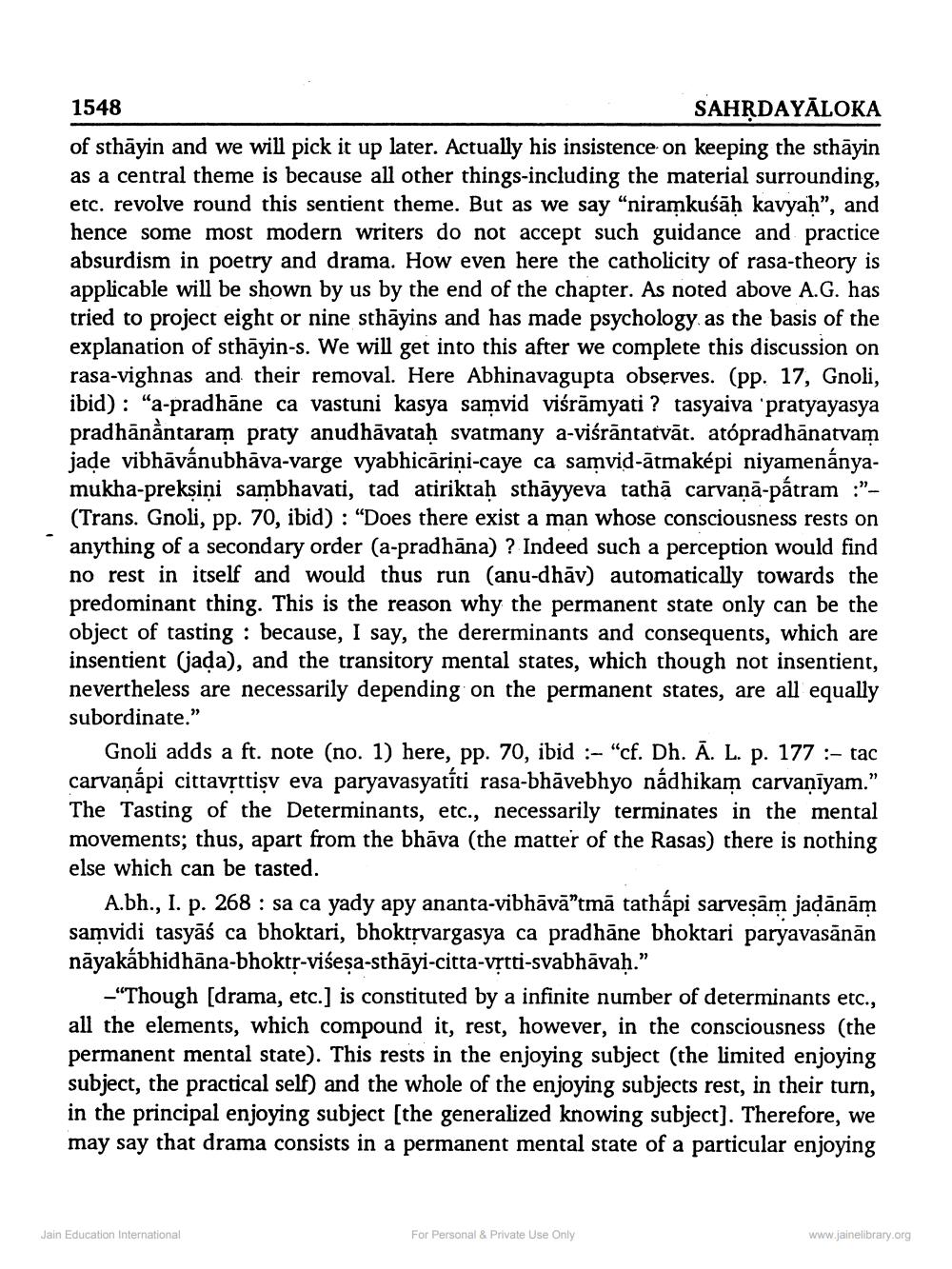________________
1548
SAHRDAYĀLOKA
of sthāyin and we will pick it up later. Actually his insistence on keeping the sthāyin as a central theme is because all other things-including the material surrounding, etc. revolve round this sentient theme. But as we say “niramkuśāh kavyah", and hence some most modern writers do not accept such guidance and practice absurdism in poetry and drama. How even here the catholicity of rasa-theory is applicable will be shown by us by the end of the chapter. As noted above A.G. has tried to project eight or nine sthāyins and has made psychology as the basis of the explanation of sthāyin-s. We will get into this after we complete this discussion on rasa-vighnas and their removal. Here Abhinavagupta observes. (pp. 17, Gnoli, ibid) : “a-pradhāne ca vastuni kasya samvid viśrāmyati ? tasyaiva 'pratyayasya pradhānàntaram praty anudhāvatah svatmany a-viśrāntatvāt. atópradhānatyam jade vibhāvánubhāva-varge vyabhicāriņi-caye ca samvid-ātmaképi niyamenányamukha-prekşiņi sambhavati, tad atiriktaḥ sthāyyeva tathā carvaņā-pátram :"(Trans. Gnoli, pp. 70, ibid): “Does there exist a man whose consciousness rests on anything of a secondary order (a-pradhāna) ? Indeed such a perception would find no rest in itself and would thus run (anu-dhāv) automatically towards the predominant thing. This is the reason why the permanent state only can be the object of tasting : because, I say, the dererminants and consequents, which are insentient (jada), and the transitory mental states, which though not insentient, nevertheless are necessarily depending on the permanent states, are all equally subordinate."
Gnoli adds a ft. note (no. 1) here, pp. 70, ibid :- "cf. Dh. Ā. L. p. 177 :- tac carvaņápi cittavrttişv eva paryavasyaríti rasa-bhāvebhyo nádhikam carvanīyam.” The Tasting of the Determinants, etc., necessarily terminates in the mental movements; thus, apart from the bhāva (the matter of the Rasas) there is nothing else which can be tasted.
A.bh., I. p. 268 : sa ca yady apy ananta-vibhāvā”tmā tathápi sarvesām jaļānām samvidi tasyāś ca bhoktari, bhoktrvargasya ca pradhāne bhoktari paryavasānān nāyakábhidhāna-bhoktư-viśeșa-sthāyi-citta-vrtti-svabhāvaḥ."
-“Though [drama, etc.] is constituted by a infinite number of determinants etc., all the elements, which compound it, rest, however, in the consciousness (the permanent mental state). This rests in the enjoying subject (the limited enjoying subject, the practical self) and the whole of the enjoying subjects rest, in their turn, in the principal enjoying subject (the generalized knowing subject). Therefore, we may say that drama consists in a permanent mental state of a particular enjoying
Jain Education International
For Personal & Private Use Only
www.jainelibrary.org




